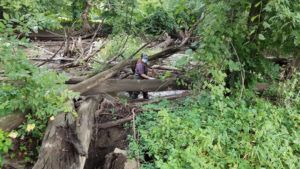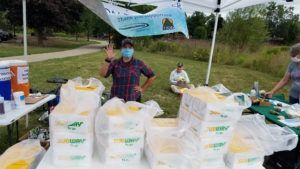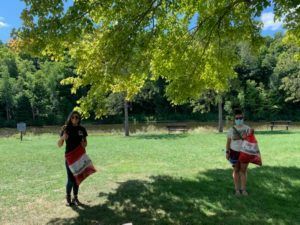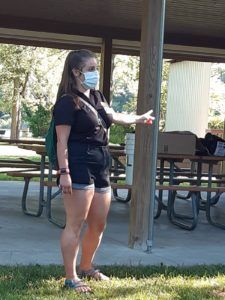So long and farewell from On the Water
 When I started developing the On the Water program, I was living my dream. I created a volunteer watershed habitat improvement program that was designed to have a positive impact on freshwater and habitats throughout the state and to connect and engage Michigan residents to their natural resources by highlighting and educating the importance of freshwater. I was able to get up each day and work alongside project partners who burst with the same passion. We were striving to make Michigan’s natural resources continuously better for future generations of conservationists. We were helping each other to succeed, and their resourcefulness and drive inspired me. We worked tirelessly to accomplish the seemingly impossible task of maintaining Michigan’s watersheds.
When I started developing the On the Water program, I was living my dream. I created a volunteer watershed habitat improvement program that was designed to have a positive impact on freshwater and habitats throughout the state and to connect and engage Michigan residents to their natural resources by highlighting and educating the importance of freshwater. I was able to get up each day and work alongside project partners who burst with the same passion. We were striving to make Michigan’s natural resources continuously better for future generations of conservationists. We were helping each other to succeed, and their resourcefulness and drive inspired me. We worked tirelessly to accomplish the seemingly impossible task of maintaining Michigan’s watersheds.
OTW finished its 2020 field season by engaging 451, volunteers that removed 6865 pounds of trash and 110 pounds of invasive species! We have also impacted 1751 acres of Michigan land. OTW had an amazing 2020 season and wants to thank the Consumers Energy Foundation for its dedication to conservation and willingness to reach broad user groups through freshwater cleanups.
 OTW did not receive funding for the 2021 field season and will be coming to an end next week. Over the last two field seasons, OTW has engaged over 650 volunteers, cleaned up 1872 acres of watersheds, removed 8665 pounds of trash and 1510 pounds of invasive species. The OTW program will be leaving behind a positive and everlasting impact on the watersheds and communities throughout the state of Michigan. The environment and natural resources of Michigan will still have long-term ecological benefits from the completion of this project and the overall program. OTW hopes to receive funding and continue on this amazing legacy for MUCC and for the state of Michigan.
OTW did not receive funding for the 2021 field season and will be coming to an end next week. Over the last two field seasons, OTW has engaged over 650 volunteers, cleaned up 1872 acres of watersheds, removed 8665 pounds of trash and 1510 pounds of invasive species. The OTW program will be leaving behind a positive and everlasting impact on the watersheds and communities throughout the state of Michigan. The environment and natural resources of Michigan will still have long-term ecological benefits from the completion of this project and the overall program. OTW hopes to receive funding and continue on this amazing legacy for MUCC and for the state of Michigan.
OTW’s impact on individuals and communities is not just measured by the number of volunteers that came out to each of the events but by the countless number of others that will benefit from the work that we accomplished. Thank you to all of the volunteers who have come out and made a difference in their watershed and communities and are striving to become better environmental stewards. You made this dream job a reality. The work you have put forth for conservation is recognized and appreciated.
the countless number of others that will benefit from the work that we accomplished. Thank you to all of the volunteers who have come out and made a difference in their watershed and communities and are striving to become better environmental stewards. You made this dream job a reality. The work you have put forth for conservation is recognized and appreciated.
I want to thank all of the project partners who gave me and this program a shot and took a chance on this newly forming program. I can’t express how much it means to me, OTW wouldn’t have been successful if it wasn’t for the project partners that made the OTW events happen. These project partners were the ones with the knowledge about where in the watershed the trash and invasive species were and how to go about the proper techniques to make these events happen and to be successful.
 Our volunteers and project partners have seen a need for a program just like this in Michigan and have contributed to making it the success that it has become. There is a need and a desire for a successful program like OTW to carry on in the state of Michigan.
Our volunteers and project partners have seen a need for a program just like this in Michigan and have contributed to making it the success that it has become. There is a need and a desire for a successful program like OTW to carry on in the state of Michigan.
I want to thank MUCC for giving me this opportunity to create a thriving program from the ground up. I have never had this much creative freedom in my field before. From choosing my title to creating the OTW logo to choosing who I want to partner with. MUCC has given me the liberty and freedom to make OTW the success that it was in such a short amount of time.
It has been an honor to have had this opportunity to create this program that I love for the past 18 months, and I appreciate all of the support I have received from co-workers, project partners, friends and family. I put my heart and soul into this program, and I care deeply about how it has positively impacted Michigan watersheds.
So long and farewell,
Emma Nehan and OTW
The post So long and farewell from On the Water appeared first on Michigan United Conservation Clubs.
Recent Posts



